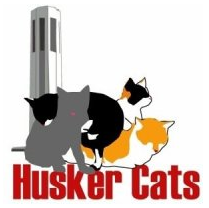
Husker Cats is continuing to make a positive impact on UNL's feral feline population.
Formed two years ago, the all-volunteer, award-winning group has trapped and lined up veterinary care (including spaying and neutering) for 70 cats that live on City Campus. Of those 70, 15 were adopted into area homes, while the rest were returned to campus to help with rodent control.
Along with the trap-and-release program, the Husker Cats volunteers also continue to provide food in a series of feeding stations positioned strategically across campus.
"We're not there yet, but we're getting closer to stabilizing the population of feral cats on City Campus," said Phyllis Larsen, steering committee chair for Husker Cats and a lecturer in the College of Journalism and Mass Communications. "We're not seeing a lot of new litters being born on campus and we're not seeing a lot of illness within the feral cat population."
Richie Graham, a professor with the University Libraries, was the driving force behind the creation of Husker Cats. It grew from a handful of members to a current roster of more than 80 volunteers and 210 members on Facebook.
Husker Cats is a recognized volunteer program that does not receive funding from UNL. The group's success has been built on volunteers working to organize veterinary care, foster homes, feeding stations and food and monetary donations.
In May 2009, Lincoln's Capital Humane Society honored Husker Cats volunteers with the John F. "Rick" Akin Award. The award honors individuals, groups and businesses that have made significant contributions to the welfare and protection of animals. The award is named after Akin, who served on the Capital Humane Society from 1976 to 1984, and was forced to resign after being diagnosed with Lou Gehrig's disease.
"From its modest beginning of a pilot operation two years ago, Husker Cats' volunteers have successfully developed a program for caring and feeding UNL's feral cat population, I am impressed with the group's dedication and genuine concern," said Chris Jackson, vice chancellor for business and finance. "A healthy feral cat population is important for the campus. The group has educated us and they have listened and addressed our concerns. It's a great partnership from which UNL and the campus cats have benefited."
The group also continues to educate faculty, staff, students and the public about UNL's feral cat population. Key points include teaching others not to feed or try to handle the cats.
"We ask that you do not feed the cats. They are well-fed and receive a premium quality food designed to reduce waste product from the cats," said Larsen. "Feeding them creates more trash and causes additional problems by drawing more wild animals to campus."
The Husker Cats feeding program has been fine-tuned through experience, and provides just the amount of food the cats can eat during daylight, eliminating an easy food source for other wild animals that come out at night.
"Also, it's not a good idea to try and handle a feral cat," said Larsen. "They might look friendly, but these are still wild animals."
The majority of the City Campus cats have been vaccinated for rabies and other diseases through the trap-and-release program. However, Larsen said a small number of adults -- between 15 and 20 -- have remained elusive and not been trapped.
"If you want to help out the cats on campus, consider giving a donation to or get involved with Husker Cats," said Larsen. "We continue to need donations to help fund veterinary care for the cats. We also are looking for someone to help with our online presence, and we need more foster or adoptive homes."
To get involved, or for more information on Husker Cats, go to http://www.huskercats.org.
- Troy Fedderson, University Communications
More details at: http://www.huskercats.org